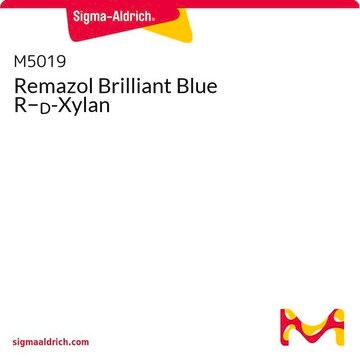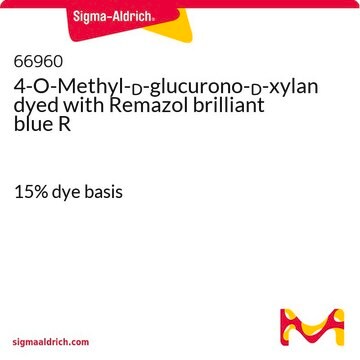X4252
Xylan from beechwood
≥90% (HPLC), cell wall polysaccharide
Sinónimos:
Poly(β-D-xylopyranose[1→4])
Iniciar sesiónpara Ver la Fijación de precios por contrato y de la organización
About This Item
Productos recomendados
origen biológico
synthetic
Análisis
≥90% (HPLC)
formulario
powder
mp
300 °C
Descripción general
Major component of plant cell wall hemicellulose. Polysaccharide primarily consisting of xylose and arabinose.
Calidad
>90% xylose residues
Código de clase de almacenamiento
13 - Non Combustible Solids
Clase de riesgo para el agua (WGK)
WGK 3
Punto de inflamabilidad (°F)
Not applicable
Punto de inflamabilidad (°C)
Not applicable
Equipo de protección personal
Eyeshields, Gloves, type N95 (US)
Certificados de análisis (COA)
Busque Certificados de análisis (COA) introduciendo el número de lote del producto. Los números de lote se encuentran en la etiqueta del producto después de las palabras «Lot» o «Batch»
¿Ya tiene este producto?
Encuentre la documentación para los productos que ha comprado recientemente en la Biblioteca de documentos.
Hitomi Ichinose et al.
Applied microbiology and biotechnology, 80(3), 399-408 (2008-07-31)
A gene encoding an alpha-L-arabinofuranosidase, designated SaAraf43A, was cloned from Streptomyces avermitilis. The deduced amino acid sequence implies a modular structure consisting of an N-terminal glycoside hydrolase family 43 module and a C-terminal family 42 carbohydrate-binding module (CBM42). The recombinant
K B Bastawde
World journal of microbiology & biotechnology, 8(4), 353-368 (1992-07-01)
Xylans, the major portion of the hemicellulose of plant cell walls and grasses, are heteropolymers consisting principally of xylose and arabinose. Microbial xylanases with different multiplicities and properties are reported. Most studies on the mode of action of these xylanases
Kai Chi et al.
Nanoscale, 9(39), 15144-15158 (2017-10-04)
Acid hydrolyzed bacterial crystalline nanocellulose (BCNC) with different nanofiber morphologies, geometrical dimensions, crystalline structure and mechanical properties were obtained by adding different polysaccharides into the growing culture medium. Arabinogalactan had little effect on the characteristics of BCNC due to its
Rui Ma et al.
Journal of agricultural and food chemistry, 65(6), 1139-1145 (2017-01-10)
Xylooligosaccharides as emerging prebiotics are able to promote the growth of probiotic bacteria. In the present study, four neutral, thermostable xylanases (MtXyn11A, MtXyn11At, MtXyn11B, and MtXyn11C) from compost fungus Mycothermus thermophilus CGMCC3.18119 were overexpressed in Pichia pastoris GS115 and used
Paul Daly et al.
Fungal genetics and biology : FG & B, 102, 4-21 (2016-05-07)
Gaining new knowledge through fungal monoculture responses to lignocellulose is a widely used approach that can lead to better cocktails for lignocellulose saccharification (the enzymatic release of sugars which are subsequently used to make biofuels). However, responses in lignocellulose mixed
Nuestro equipo de científicos tiene experiencia en todas las áreas de investigación: Ciencias de la vida, Ciencia de los materiales, Síntesis química, Cromatografía, Analítica y muchas otras.
Póngase en contacto con el Servicio técnico




